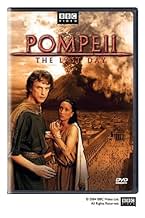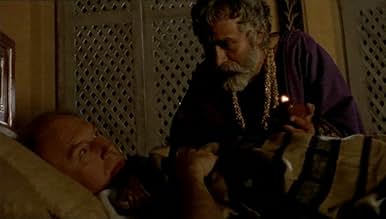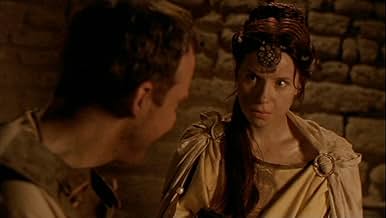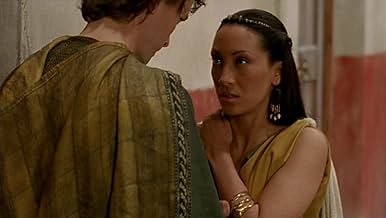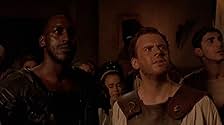IMDb RATING
7.1/10
1.1K
YOUR RATING
A dramatized recreation of the destruction of Pompeii and Herculaneum when Mount Vesuvius erupted in 79 AD.A dramatized recreation of the destruction of Pompeii and Herculaneum when Mount Vesuvius erupted in 79 AD.A dramatized recreation of the destruction of Pompeii and Herculaneum when Mount Vesuvius erupted in 79 AD.
- Director
- Writers
- Stars
- Won 1 Primetime Emmy
- 1 win & 1 nomination total
Alisdair Simpson
- Narrator
- (UK version)
- (voice)
Rebecca Norton
- Fortunata
- (as Rebecca Clarke)
George Antoni
- Felix
- (as George Yiasoumi)
F. Murray Abraham
- Narrator
- (US version)
- (voice)
Tony Amendola
- Pomponianus
- (uncredited)
Omar Berdouni
- Callistus
- (uncredited)
Emily Canfor-Dumas
- Slave Girl
- (uncredited)
- Director
- Writers
- All cast & crew
- Production, box office & more at IMDbPro
Featured reviews
I've seen many documentaries but few have gripped me as this one did. The combination of live action, computer graphics, and scholarly voice-over made it a compelling picture. Unlike many feature films, I didn't even look at the clock to see when it would be over.
The only drawback for me was that some of the science went by a little too quickly. I got the general idea of "the column collapses" but would have liked it to be explored a little more in order to have a more comprehensive view.
The inclusion of artifacts was especially moving, particularly when paired with imagined scenes. Overall this is a great documentary -- we could use more like it!
The only drawback for me was that some of the science went by a little too quickly. I got the general idea of "the column collapses" but would have liked it to be explored a little more in order to have a more comprehensive view.
The inclusion of artifacts was especially moving, particularly when paired with imagined scenes. Overall this is a great documentary -- we could use more like it!
The first thing I ever really learned about the Roman Empire was about the eruption of Mount Vesuvius in AD79. I was in Grade 4 or 5 at the time, and read a book (I don't remember the title) that described Pompeii's last day from the perspective of a young boy in the city. The book drew me into the events and gave me a lifelong curiosity about the eruption and the people who experienced it. This superb BBC documentary takes on the same challenge - and pulls it off spectacularly. With a narration that offers a lot of important historical and scientific information combined with some excellent dramatic recreations of the events, which include graphic descriptions of the horrific ways in which some people died, and with archaeological footage mixed in especially near the end (the body casts and skeletons that have been found are such poignant reminders of the fact that real people suffered and died in this cataclysm) this production is absolutely fascinating, and anyone with even a remote interest in what happened on August 24 AD79 should take the time to watch this.
About the only criticism I would make is of a perhaps overly dramatic end. Noting that 3 million people now live in the area surrounding Vesuvius, the narration notes that such eruptions occur about every two thousand years - meaning the time is ripe for another. I've actually come across nothing suggesting such a specific timetable, and suspect that was included just to heighten the drama as the program came to its end. If so, it wasn't necessary. Vesuvius may well erupt again. I know the Italian government actually keeps a close watch on it and has evacuation plans ready for the region if need be. But even if it never erupts again, the eruption of AD79 and the ensuing nightmare it threw so many into will never be forgotten.
About the only criticism I would make is of a perhaps overly dramatic end. Noting that 3 million people now live in the area surrounding Vesuvius, the narration notes that such eruptions occur about every two thousand years - meaning the time is ripe for another. I've actually come across nothing suggesting such a specific timetable, and suspect that was included just to heighten the drama as the program came to its end. If so, it wasn't necessary. Vesuvius may well erupt again. I know the Italian government actually keeps a close watch on it and has evacuation plans ready for the region if need be. But even if it never erupts again, the eruption of AD79 and the ensuing nightmare it threw so many into will never be forgotten.
By far this was the best documentary that l ever saw, Pompeii always invoked my attention since my school days, the unsurprised BBC made a masterpiece blending dramatization with scenes shot at Pompeii rediscovered, each single building on every corner were introduced on a smart narrative, all this was supplied by an priceless gift from the eyewitness called Plinius the younger who wrote all happenings on that day in a book on smallest details, which nobody took it seriously due the newest and weird info on unprecedented scale over the facts, also the Vesuvius and their pumice stone that buried the city, miraculously preserves all remaining buildings, paintings, graffiti art, which allowed to archeologists a best understanding over the Roman Empire, due all others surviving cities already change the whole ancient complex, extremely and highly recommended for those who really want to learn more over the most powerful empire on Earth ever had !!
Resume:
First watch: 2010 / How many: 2 / Source: DVD / Rating: 10
Resume:
First watch: 2010 / How many: 2 / Source: DVD / Rating: 10
The dramatised documentary of Pompeii was not that great. The special effects were good, although some things didn't quite happen as it did. Besides the effects of the volcanic eruption itself that others have gone into, and I won't even comment on, the rest was just more propaganda than telling a historic tale.
It was unfair of the BBC to portray one of the dead Pompeii victims as a horrid bad man. It left a nasty taste in my mouth and that was enough for me. The character Stephanus the Fuller may have been a really nice and kind man but this drama turned him into the villain. I'm not sure how they can really make things like that and be given so many awards.
I've seen several documentaries about Pompeii and Herculaneum but this one is by far the best. It is of exceptional quality throughout and I just can't imagine making a better film to discuss the horror when Mount Vesuvius erupted.
What makes this film so interesting and well made is that it combines both live action recreations of the lives of many of the victims and greatly humanizes the tragedy. This makes this film so good--these aren't just special effects or caricatures but actual real people whose lives have been recreated by archaeologists who have examined their remains (such as the slave girl who tried, in vain, to protect the child in her charge). Now this alone might have been moving but also is only half the story. In addition, current views of the buildings and casts of victims bring to bear the full story--showing the the contrast between then and now.
Despite the film making the stories so sad, it also was done in a very respectful and non-sensational manner--complete with beautifully somber and appropriate music. Perfect and well done in every way--a must for everyone to see.
By the way, this BBC production was shown on US television and was highly edited and material was added. I have seen both and prefer the original British version--though both are worth while.
What makes this film so interesting and well made is that it combines both live action recreations of the lives of many of the victims and greatly humanizes the tragedy. This makes this film so good--these aren't just special effects or caricatures but actual real people whose lives have been recreated by archaeologists who have examined their remains (such as the slave girl who tried, in vain, to protect the child in her charge). Now this alone might have been moving but also is only half the story. In addition, current views of the buildings and casts of victims bring to bear the full story--showing the the contrast between then and now.
Despite the film making the stories so sad, it also was done in a very respectful and non-sensational manner--complete with beautifully somber and appropriate music. Perfect and well done in every way--a must for everyone to see.
By the way, this BBC production was shown on US television and was highly edited and material was added. I have seen both and prefer the original British version--though both are worth while.
Did you know
- TriviaThe film takes place from August 24 to August 25, 79 AD.
- GoofsAs the second-last pyroclastic wave stops just outside the city, the carbon dioxide it sends into the city should have affected all the lamps, dimming if not extinguishing the flames. The flames are untouched although the people are choking.
- Quotes
Alisdair Simpson - Narrator: The people of Pompeii have never seen anything like this before. There is no word in Latin for 'volcano."
- ConnectionsEdited into Je ne devrais pas être en vie: Alone in the Amazon (2010)
Details
- Release date
- Countries of origin
- Official site
- Language
- Also known as
- Pompeii: The Last Day
- Filming locations
- Production companies
- See more company credits at IMDbPro
Contribute to this page
Suggest an edit or add missing content

Top Gap
By what name was Le dernier jour de Pompéi (2003) officially released in India in English?
Answer
